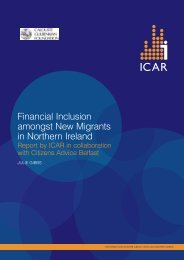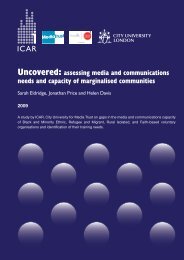Navigation guide Refugee populations in the UK: Algerians - ICAR
Navigation guide Refugee populations in the UK: Algerians - ICAR
Navigation guide Refugee populations in the UK: Algerians - ICAR
Create successful ePaper yourself
Turn your PDF publications into a flip-book with our unique Google optimized e-Paper software.
egular journal (<strong>in</strong> French) conta<strong>in</strong><strong>in</strong>g new, full-length novels or collections of short stories and poetry,<br />
motivated by <strong>the</strong> conviction that artistic production can contribute to <strong>the</strong> peaceful resolution of <strong>the</strong><br />
conflict. In <strong>the</strong> <strong>UK</strong>, two Algerian writers contribute to <strong>the</strong> association Exiled Writers Ink; <strong>the</strong> artist and<br />
poet Nafissa Boudalia and <strong>the</strong> poet and short story writer Samia Dahnaan.<br />
1 Djaout is perhaps best known for Les chercheurs d’os (Search<strong>in</strong>g for bones) (1984) and Dernier été de la raison<br />
(The last summer of reason) published posthumously <strong>in</strong> 1999.<br />
2 Khadra, Y. (1998) Les agneaux du seigneur. Julliard, Paris; Khadra, Y. (1999) A quoi rêvent les loups. Julliard,<br />
Paris.<br />
3 Such Arezki Mellal (2000) Ma<strong>in</strong>tenant, Ils peuvent venir, Editions barzakh, Algiers.<br />
Music<br />
The tremendous diversity of musical styles and traditions <strong>in</strong> Algeria reflects <strong>the</strong> diverse ethnic orig<strong>in</strong>s of <strong>the</strong><br />
population. 79 The most common form of classical music orig<strong>in</strong>ates <strong>in</strong> Andalusia, Spa<strong>in</strong>, and arrived <strong>in</strong><br />
Algeria <strong>in</strong> <strong>the</strong> fifteenth century, follow<strong>in</strong>g <strong>the</strong> expulsion of <strong>the</strong> Arabic population from Spa<strong>in</strong>. This music is<br />
often called maalouf or andalus and is played on traditional <strong>in</strong>struments. 80<br />
There is also a tradition of folk music sung <strong>in</strong> Berber languages. Idir is currently one of <strong>the</strong> most popular<br />
Berber musicians; he gave a rare concert <strong>in</strong> <strong>the</strong> <strong>UK</strong> <strong>in</strong> 2002 and played to a huge crowd at <strong>the</strong> Barbican.<br />
Lounes Matoub, ano<strong>the</strong>r Berber musician, was killed <strong>in</strong> mysterious circumstances <strong>in</strong> 1998. He was always<br />
an extremely popular s<strong>in</strong>ger and s<strong>in</strong>ce his death he has become an extremely powerful symbol of Berber<br />
culture and his music is rarely absent from Berber demonstrations.<br />
There is a fur<strong>the</strong>r cultural <strong>in</strong>fluence from <strong>the</strong> pieds noirs; <strong>the</strong> tremendously popular Jewish-Algerian s<strong>in</strong>ger<br />
Enrico Macias reta<strong>in</strong>s his l<strong>in</strong>ks with Algeria, though he now lives <strong>in</strong> France. F<strong>in</strong>ally <strong>the</strong>re is a long tradition of<br />
Arabic folk music or chaabi. Chaabi songs are concerned with classic popular <strong>the</strong>mes of love and duty but<br />
also relate a particular vision of developments <strong>in</strong> Algerian society from emigration <strong>in</strong> <strong>the</strong> 1950s to despair at<br />
<strong>the</strong> current conflict today. Contemporary raï music has developed <strong>the</strong>se concerns. In fact it is common for<br />
modern raï s<strong>in</strong>gers to update classic chaabi songs, such as ‘Ya Raya!’ (O, you who are leav<strong>in</strong>g). Written <strong>in</strong><br />
1954 about emigration, it has become a standard and most raï s<strong>in</strong>gers perform <strong>the</strong>ir own version of its<br />
classic, easily recognisable melody.<br />
Raï<br />
A comb<strong>in</strong>ation of traditional Algerian rhythms and modern electric <strong>in</strong>struments, raï developed <strong>in</strong> <strong>the</strong> town<br />
of Oran <strong>in</strong> Western Algeria. It orig<strong>in</strong>ated <strong>in</strong> <strong>the</strong> early 1980s and soon became associated with youth<br />
rebellion and anti-establishment behaviour. Early raï musicians were strongly disapproved of as socially<br />
deviant and morally corrupt<strong>in</strong>g by traditionally orientated ma<strong>in</strong>stream society, similar to punk <strong>in</strong> Brita<strong>in</strong>;<br />
<strong>in</strong>deed musicians such as French-Algerian Rachid Taha cont<strong>in</strong>ue to make a conscious effort to develop<br />
<strong>the</strong> punk-raï connection. Rai was particularly disapproved of by Islamist groups. The local FIS<br />
adm<strong>in</strong>istration banned <strong>the</strong> 1991 raï festival <strong>in</strong> Oran due to <strong>the</strong> glorification of over-dr<strong>in</strong>k<strong>in</strong>g and sex <strong>in</strong><br />
some raï songs. Raï s<strong>in</strong>gers such as Cheb Hasni were targeted <strong>in</strong> <strong>the</strong> wave of assass<strong>in</strong>ations of 1993<br />
and 1994 and many jo<strong>in</strong>ed o<strong>the</strong>r artists <strong>in</strong> exile. Raï is sometimes seen as a form of resistance to<br />
79 This is clear from Algerian radio. A good range of Algerian radio stations is available onl<strong>in</strong>e at<br />
http://www.vtuner.com/vtunerweb/static/staticAlgeriaoverall1.html [accessed 5 May 2004].<br />
80 Musique andalouse d’Algérie (Harmonia Mundi 2003) by Nassima is an excellent, recent example of this music.<br />
<strong>Navigation</strong> <strong>guide</strong> to refugee <strong>populations</strong>: <strong>Algerians</strong><br />
©<strong>ICAR</strong> 2004, moral rights Michael Collyer<br />
36

















